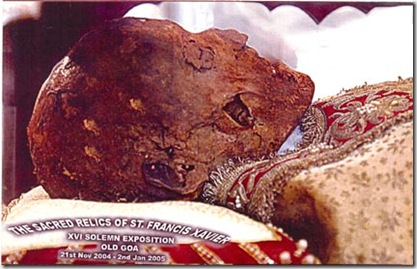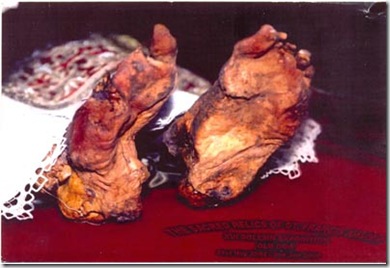We already covered relics two days ago, I really can't be bothered to cover old ground.
Let's look at protestantism from a Catholic angle, this article resonates well with what I am coming to believe.
150 Reasons why I am Catholic. Here's the first 31 reasons....discuss. (Ps this person was a Baptist who converted to Catholicism)
1.*Best One-Sentence Summary: I am convinced that the Catholic Church conforms much more closely to all of the*biblical data, offers the only coherent view of thehistory of Christianity*(i.e., Christian, apostolic Tradition), and possesses the most profound and sublime Christian morality, spirituality, social ethic, and philosophy.
2.*Alternate: I am a Catholic because I sincerely believe, by virtue of much cumulative evidence, that Catholicism is*true, and that the Catholic Church is the visible Church divinely-established by our Lord Jesus, against which the gates of hell cannot and will not prevail (Mt 16:18), thereby possessing an*authority*to which I feel bound in Christian duty to submit.
3.*2nd Alternate: I left Protestantism because it was seriously deficient in its interpretation of the Bible (e.g., "faith alone" and many other "Catholic" doctrines - see evidences below), inconsistently selective in its espousal of various Catholic Traditions (e.g., the Canon of the Bible), inadequate in its ecclesiology, lacking a sensible view of Christian history (e.g., "Scripture alone"), compromised morally (e.g., contraception, divorce), and unbiblically schismatic, anarchical, and relativistic. I don't therefore believe that Protestantism is all bad (not by a long shot), but these are some of the major deficiencies I eventually saw as fatal to the "theory" of Protestantism, over against Catholicism. All Catholics must regard baptized, Nicene, Chalcedonian Protestants as Christians
.
4. Catholicism isn't formally*divided and sectarian*(Jn 17:20-23;*Rom 16:17;*1 Cor 1:10-13).
5. Catholic*unity*makes Christianity and Jesus more believable to the world (Jn 17:23).
6. Catholicism, because of its unified, complete, fully supernatural Christian vision, mitigates againstsecularization and humanism.
7. Catholicism avoids an unbiblical*individualism*which undermines Christian community (e.g.,*1 Cor 12:25-26).
8. Catholicism avoids*theological*relativism, by means of dogmatic certainty and the centrality of the papacy.
9. Catholicism avoids*ecclesiological anarchism*- one cannot merely jump to another denomination when some disciplinary measure or censure is called for.
10. Catholicism formally (although, sadly, not always in practice) prevents the theological*relativism*which leads to the uncertainties within the Protestant system among laypeople.
11. Catholicism rejects the*"State Church,"*which has led to governments dominating Christianity rather than vice-versa.
12. Protestant State Churches greatly influenced the rise of*nationalism, which mitigated against universal equality and Christian universalism (i.e., Catholicism).
13. Unified Catholic Christendom (before the 16th century) had not been plagued by the tragic*religious wars*which in turn led to the "Enlightenment," in which men rejected the hypocrisy of inter-Christian warfare and decided to become indifferent to religion rather than letting it guide their lives.
14. Catholicism retains the elements of*mystery, supernatural, and the*sacred*in Christianity, thus opposing itself to*secularization, where the sphere of the religious in life becomes greatly limited.
15. Protestant individualism led to the*privatization*of Christianity, whereby it is little respected in societal and political life, leaving the "public square" barren of Christian influence.
16. The secular false dichotomy of*"church vs. world"has led committed orthodox Christians, by and large, to withdraw from politics, leaving a void filled by pagans, cynics, unscrupulous, and power-hungry. Catholicism offers a framework in which to approach the state and civic responsibility.
17. Protestantism leans too much on mere*traditions of men*(every denomination stems from one Founder's vision. As soon as two or more of these contradict each other, error is necessarily present).
18. Protestant churches (esp. evangelicals), are far too often guilty of putting their pastors on too high of a pedestal. In effect,*every pastor becomes a "pope,"*to varying degrees (some are "super-popes"). Because of this, evangelical congregations often experience a severe crisis and/or split up when a pastor leaves, thus proving that their philosophy is overly man-centered, rather than God-centered.
19. Protestantism, due to lack of real authority and dogmatic structure, is tragically prone to accommodation to the*spirit of the age, and*moral faddism.
20. Catholicism retains*apostolic succession, necessary to know what is true Christian apostolic Tradition. It was the criterion of Christian truth used by the early Christians.
21. Many Protestants take a dim view towards*Christian history*in general, esp. the years from 313 (Constantine's conversion) to 1517 (Luther's arrival). This ignorance and hostility to Catholic Tradition leads to theological relativism, anti-Catholicism, and a constant, unnecessary process of "reinventing the wheel."
22. Protestantism from its inception was*anti-Catholic, and remains so to this day (esp. evangelicalism). This is obviously wrong and unbiblical if Catholicism is indeed Christian (if it isn't, then - logically - neither is Protestantism, which inherited the bulk of its theology from Catholicism). The Catholic Church, on the other hand, is not anti-Protestant.
23. The Catholic Church accepts the authority of the great*Ecumenical Councils*(see, e.g.,*Acts 15) which defined and developed Christian doctrine (much of which Protestantism also accepts).
24. Most Protestants do not have*bishops, a Christian office which is biblical (1 Tim 3:1-2) and which has existed from the earliest Christian history and Tradition.
25. Protestantism has no way of*settling doctrinal issues*definitively. At best, the individual Protestant can only take a head count of how many Protestant scholars, commentators, etc. take such-and-such a view on Doctrine X, Y, or Z. There is no unified Protestant Tradition.
26. Protestantism arose in 1517, and is a "Johnny-come-lately" in the history of Christianity. Therefore it cannot possibly be the "restoration" of "pure", "primitive" Christianity, since this is ruled out by the fact of its*absurdly late appearance. Christianity must have historic continuity or it is not Christianity. Protestantism is necessarily a "parasite" of Catholicism, historically and doctrinally speaking.
27. The Protestant notion of the*"invisible church"*is also novel in the history of Christianity and foreign to the Bible (Mt 5:14;*Mt 16:18), therefore untrue.
28. When Protestant theologians speak of the teaching of early Christianity (e.g., when refuting "cults"), they say "the Church taught . . ." (as it was then unified), but when they refer to the present they instinctively and inconsistently refrain from such terminology, sinceuniversal teaching authority*now clearly resides only in the Catholic Church.
29. The Protestant principle of*private judgment*has created a milieu (esp. in Protestant America) in which (invariably) man-centered "cults" such as Jehovah's Witnesses, Mormonism, and Christian Science arise. The very notion that one can "start" a new, or "the true" Church is Protestant to the core.
30. The lack of a*definitive teaching authority*in Protestant (as with the Catholic magisterium) makes many individual Protestants think that they have a direct line to God, notwithstanding all of Christian Tradition and the history of biblical exegesis (a*"Bible, Holy Spirit and me" mentality). Such people are generally under-educated theologically, unteachable, lack humility, and have no business making presumed "infallible" statements about the nature of Christianity.
31. Evangelicalism's*"techniques" of evangelism*are often contrived and manipulative, certainly not directly derived from the text of the Bible. Some even resemble brainwashing to a degree.
Source:
http://www.ourcatholicfaith.org/reasons.html

opcorn:



